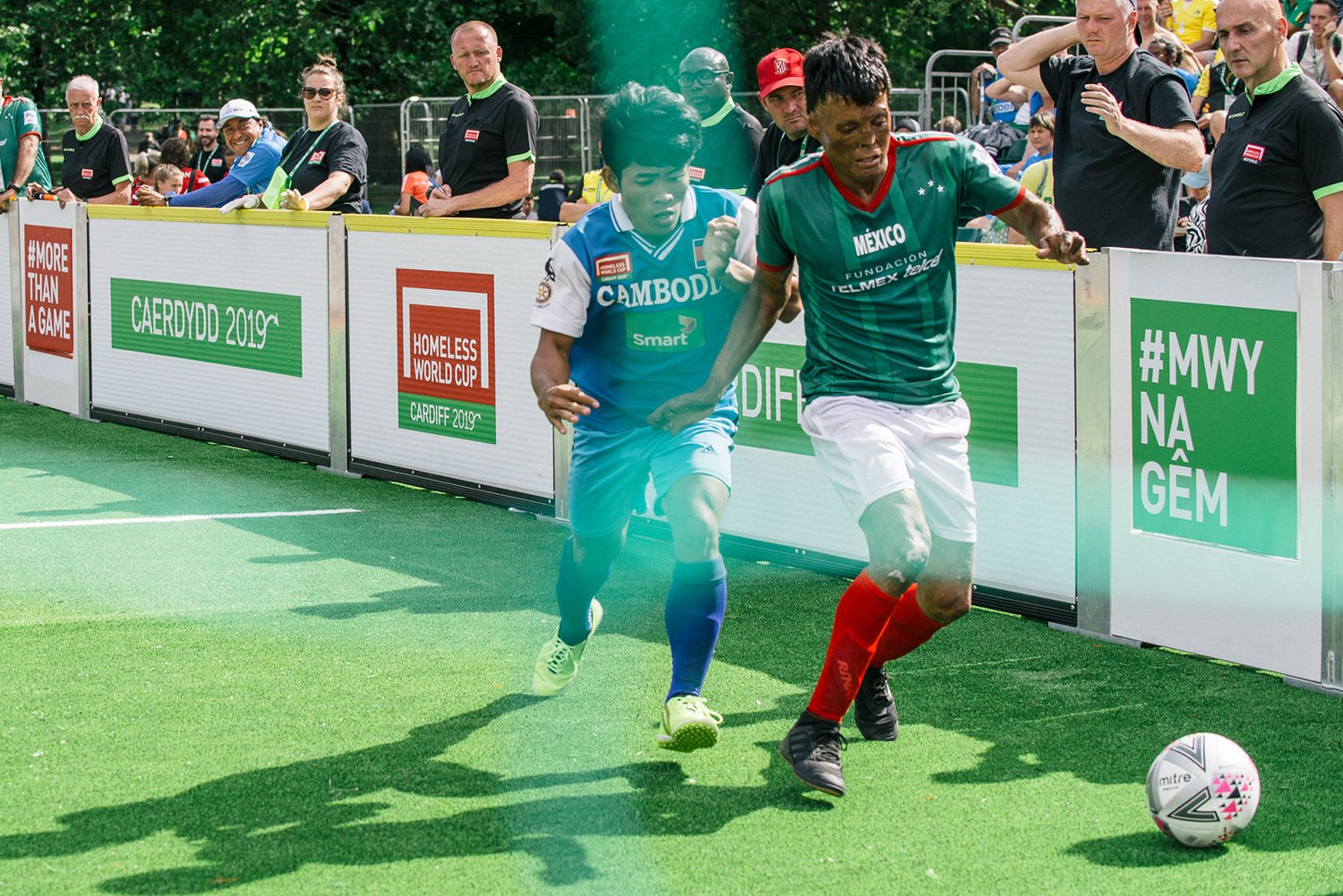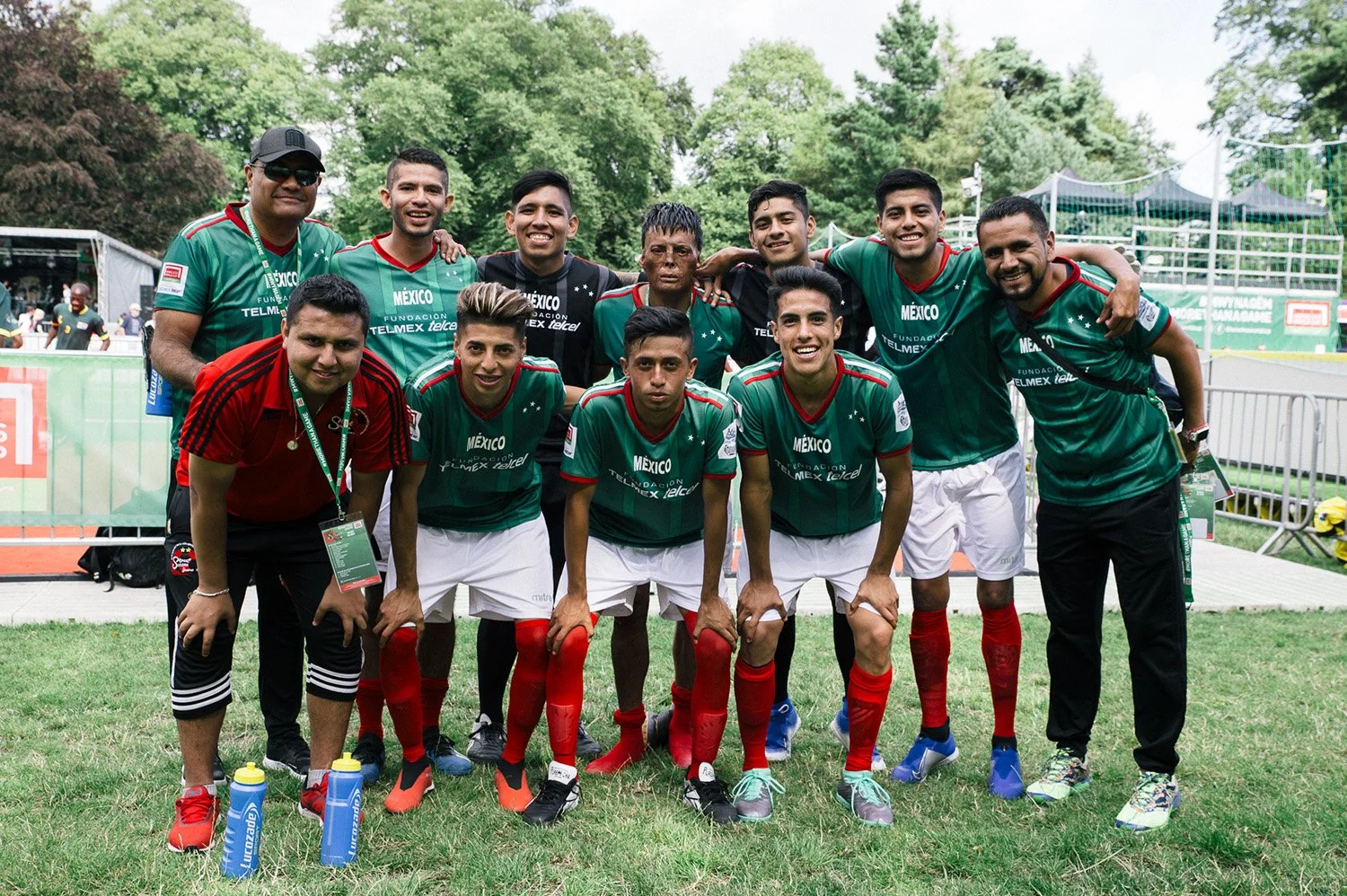“Football rewards you for all the effort you put into it”
Image: Daniel Lipinski / Soda-Visual
“I feel an enormous passion and happiness every time I kick a ball.”
Among the Mexican men’s squad taking part in this year’s Homeless World Cup is 31-year-old Juan Jesus Rios, from Ciudad Juarez in the Mexican state of Chihuahua.
Affectionately known as ‘Pinpon’, Rios found life growing up in one of Mexico’s most violent cities was one of great difficulty. He was living on the streets by the age of 14 and spent most of his life troubled by alcohol and drug use, which ultimately led to an accident in December of 2007 that saw him suffer devastating burns to 80% of his face and body.
Rios got involved with Mexico’s street soccer network in his home city in 2013 after learning about the program via a TV advert.
“When I was 13 years old I had real problems with my father, who, like the problems that life throws at you, would hit me. It was then I dropped out of school and my studies in secondary education. I left home and didn’t want to go to live with my mother because she lived far away in an area [that] was very dangerous.
“Near where my father lived I lived for about one-and-a-half to two years outside the house of my friend in a car that he had. He leant me a blanket and there I stayed. And from there I started to get involved in drugs, smoking marijuana, using inhalants, cocaine, alcohol, pills—I began to take every kind of drug.
“The drug that I used most was cocaine, and because of that I ended up very, very thin. That was until my mother found out I was living on the streets and came and got me and put me into a rehabilitation centre. It was there thanks to God I got together with the mother of my children.”
And although he was able to leave the rehabilitation centre and begin his steps towards a new life as a father, a return to his drink and drug problems resulted in his life-changing accident.
|Image: Daniel Lipinski / Soda-Visual
“I had my accident, when I got burnt, on the 11th of December of 2007. The worst day of my life. My partner was pregnant at the time and at that moment I was working for a drug trafficker and drug dealers, selling drugs in the USA and in my home city of [Ciudad] Juarez.
“One day I arrived home and encountered my wife outside my house. She’d been thrown out by my brothers and sister because it was their house. I was drunk and had taken pills—I was very intoxicated—and seeing my wife there, six months pregnant and hungry, sent me into a rage.
“So I started fighting with my brothers and I set fire to my sister’s furniture and I told them that I was going to burn the house down. They didn’t believe me. I left and took my wife back to her house with her mum. I bought 30 pesos of petrol and returned to the house and went in and set fire to it. The door closed on me and I was stuck inside for around 5 to 10 minutes as most as the fire took hold.
“I screamed at God that I didn’t want to die, that he let me to get to know my child, that I wanted a second opportunity, and that I wasn’t going to fail. That I wanted to be a dad. And thanks to God, he gave me that opportunity. He gave me the opportunity that I asked for. Even if that meant a lot of suffering.”
It was once he’d recovered from his life-threatening injuries that Rios became aware of the work of Street Soccer Mexico.
“I learned about the street football project via an advert on TV. I always played football in my local neighbourhood. My friends would say to me, ‘Pinpon we are going for a game of football wherever, come with us for kick about’.
“A lot of people know me, know Pinpon and who I am. And everyone [who] knows me knows that when I enter onto the pitch all my problems go away. I feel an enormous passion and happiness every time I kick a ball. It’s one of the things I love most in the world, I’m passionate about the moment, I live in it, and I forget bout everything that is happening around me.
|Image: Daniel Lipinski / Soda-Visual
“Football has helped me. People insult me for my physical problems, but I tell them that they will never find themselves in my shoes or be able to feel what I have felt or feel.
“Football rewards you for all the effort you put into it—the same effort that I’ve given on a day-to-day basis to be here [in Cardiff] and I’m enjoying it as much as possible.
“I’ve fought unconditionally since I found out about the project back in 2013 and have never given up to be here at the World Cup, never let myself lose to adversity. I’ve always been a fighter. When I set my mind to something I do everything I can to achieve it—I’m one of those people [who] won’t be defeated easily.”
And even then, having a young family at home and holding down a regular job in construction meant that Rios had to make many family sacrifices to be part of the Street Soccer Mexico project and ultimately achieve his dream of representing his country.
“I can say that it was a very big sacrifice for me because when I was with my local team in Chihuahua, I went to train with the team straight from work. I left the house at seven in the morning and I didn’t get back home until 9.30 at night. It was more than 14 hours in which I wasn’t at home with my children—it was an enormous sacrifice, but my rewards has been to come here and be part of the Homeless World Cup. One that I think is a unique life experience.
“In the past few days, when I’ve spoken to my kids they’ve told me that they love me very much and they are very proud of me and that fills me with joy. Everything I’ve achieved in life I dedicate to them and my mum.”
Frustratingly for Juan, the language barrier with players from other nations has hindered his chance to understand players from other nations, but hasn’t stopped him from meeting new people—those who, like him, have suffered their own problems in life.
“We’ve all suffered. I thought that I’d suffered too much, but being around so many others here has made me realise that I’m not the only one. It encourages you to become a better person for the future, and from the very day you return home going forward. You won’t be the same person you were when you left your home to take part.
“As one friends from my neighbourhood said, ‘But mate why are you going to the Homeless World Cup, you’re not going to go on and become a professional player.’
“And I responded, but I’m going to achieve my dream of playing at a World Cup. To play [for] my country and wear the Mexican jersey. It’s not important that I don’t become a professional. What is important is that I’ve been chosen to go and play in a World Cup.
“Being here isn’t a case of coming here to play football. It serves you up to change your life, and that’s what awaits me round the corner.”
Words: Craig Williams
Images: Daniel Lipinski / Soda-Visual



